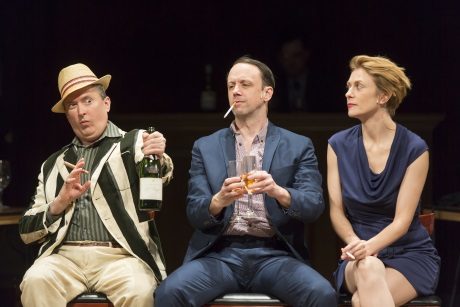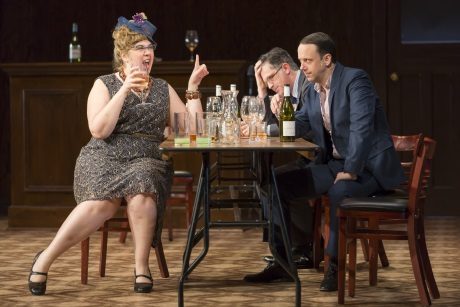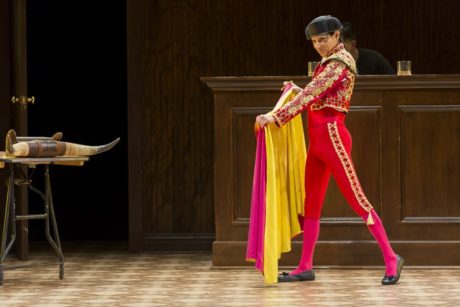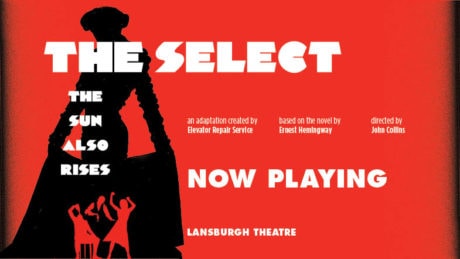The Elevator Repair Service’s production of The Select (The Sun also Rises) opened at the Lansburgh Theatre Monday, and I’m certain that Earnest Hemingway’s 1926 debut novel, known for its spare, reportage prose, never felt so alive with wit and wonder.

After all, “the sun also rises” is but an afterthought to “the sun (most definitely) sets.”
And that’s the belly-thought at the center of Hemingway’s post World War I world.
Founded in 1991, The Elevator Repair Service is an ensemble theatre known for turning prose into performance; they are also known for never changing a word of the original text.
They remained true to this knowledge on Monday. The Select is all Hemingway and his stoically brave masculinism, with an overlay of modern, theatrical sensibility–that sensibility being irony, good humor, and a delightful randomness.
Imaginatively directed by John Collins, with detailed scenery and costumes by David Zinn, effective lighting by Mark Barton, and some delicious sound effects by Matt Tierney and Ben Williams, the Elevator’s take on the novel begins with Paris café culture, namely the internationally famous Café Select.

Hence, occupying the Lansburgh Theatre’s stage is a mind-transporting full bar that the production’s 13-member ensemble transforms into any place it wants.
For here, expat Americans join Brits and other foreign royalty to become the Lost Generation.
The tale is all narrative, from the entrance of Lady Brett Ashley, all feminine mystique by the delightfully charming and hauntingly sad Stephanie Hayes, to the exit of the young bull fighter Romero, all macho and transgenderishly coy by Susie Sokol.
The tale actually begins with foreign correspondent Jake Barnes, the stoically wry Mike Iveson, a World War I veteran who left his manhood in the trenches of France. He befriends his tennis companion, the ex-Princeton, Jewish boxer Robert Cohn, the unassumingly and surprisingly bourgeois John Collins. Mr. Cohn, we discover, enjoys beating up his anti-Semitic Ivy League classmates.
Then we discover that Jake is in love with Brett and Brett is in love with him, but the absent manhood is an absence that can only be filled with absinthe, or any other liquor the shaking hand might grab.
Then we discover that Brett is in love with, albeit for a short, fabulous time, numerous men. She even marries a couple of them, for a short time, to fill the bleakness.
It’s the kind of bleakness that art, particularly theatre, has the most difficult time representing much less dramatizing. Edward Albee’s Whose Afraid of Virginia Woolf tries, but his play soars with savagery while the tragic bleakness stays hidden beneath game-playing and exorcism.
And, of course, there’s Samuel Beckett’s Waiting for Godot (and the rest of his opus). It’s post-WWII landscape, all reality for war-ravaged Europeans, seems but an absurd symbolic wasteland to Americans.

So that’s the problem that Hemingway’s novelistic prose faces when the stage becomes its medium. The reader can bear the painfully human in the quiet of the novelistic experience, most likely all solitude and late night; the audience to a spectacle, however, demands a more public decorum.
Or as Jake Barnes says:
“It is awfully easy to be hard-boiled about everything in the daytime, but at night is another thing.”
The Elevator’s playful, if a bit lengthy, take on the painfully absent purpose these characters feel not only makes that vision real but strangely palatable.
As does the desperately humorous drinking. Robert M. Johanson’s portrayal of Bill Gorton takes the prize for the funniest drinking scene in a Paris café ever.
As does the frantically rambunctious dancing choreographed by Katherine Profeta. And here the whole ensemble pulsed with desperation.
And did I mention the mystique of Ms. Hayes’s Brett, the woman every man in the play falls desperately in love with. She captures the character’s allure as well as her uncomfortable alienation.
And how about that Romero, so androgynously sexy and cool: Ms. Sokol’s battle with the bull marks the play’s high point.
A host of other characters offer their brief, yet vibrant flame to the proceedings as well. There’s Kaneza Schaal’s “out there” French prostitute and Vin Knight’s champagne loving Count Mippipopolous and Kate Scelsa’s nonstop talking Francis. Each member of the ensemble brings the culture and its strange emotional landscape to life.
If World War I torn a hole in the soul of Europe, then that hole was obliterated by an even bigger hole by World War II.
Meanwhile, holes, like vacuums, love to be filled.
In other words, the void this play and novel explores is a void too vast for any man or god to fill. Or is it?
As Brett sits emotionally disheveled on a bed, after having freed her latest, youngest lover from her mystique, she says:
You know it makes me feel rather good deciding not to be a bitch.”
Yes. [Jake responds.]
It’s sort of what we have instead of God.
Some people have God…Quite a lot.
So today, with the War on Terrorism seeming ever more endless or, at the very least, predicted to last 30 years (that’s 16 and counting), we might be feeling a wee bit lost ourselves.
And a bit disheveled.
After all, as the epigraph of The Sun Also Rises emphatically states:
We are all a lost generation.
Running Time: Approximately 3 hours, with a 15-minute intermission.
The Select (The Sun also Rises) plays through April 2, 2017, at Shakespeare Theatre Company’s Lansburgh Theatre – 450 7th Street, NW, in Washington, DC. For tickets, call the box office at (202) 547-1122, or purchase them online.
LINKS:
‘The Select (The Sun Also Rises)’ at Shakespeare Theatre Company reviewed by Robert Michael Oliver.
In The Moment: Elevator Repair Service’s ‘The Select (The Sun Also Rises’) at Shakespeare Theatre Company by David Siegel.
Magic Time!: ‘The Select (The Sun Also Rises)’ at Shakespeare Theatre Company by John Stoltenberg.






I saw this on “opening night” and noticed MANY empty seats after intermission.
Perhaps knowing there was still another 1 hour and 45 minutes to go re. characters that are all self-obsessed and lacking any compassion for others had something to do with it?
The sound ‘tricks’ and incessant ‘juggling’ of liquor bottles got old after the 3rd, 4th, 5th repeats.
I’m fortunate to be able to see 40+ plays per year in the DC metro area (some folks spend $ on golf, others on cars or boats … I enjoy theater) … and feel compelled to say that this is one of THE worst plays I’ve EVER seen.
While I’m sure the actors tried their best … the characters and Hemingway “story” and words … words … words … words … make for an insomnia-curing experience.
I AGREE totally with your review. It was PAINFUL. Too clever by half and none of the characters came off as anything other than attention-seeking bores. I do note, however, that the performance of Who is Afraid of Virginia Wolff at the Ford had a similar storyline that also spanned a good three plus hours and yet… and yet… what an amazing show. In my view, the Select came off more as a puerile attempt by a college sophomore to be “clever.”